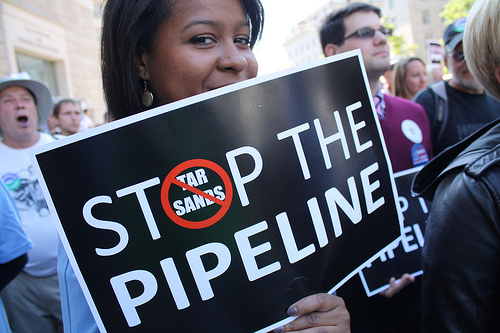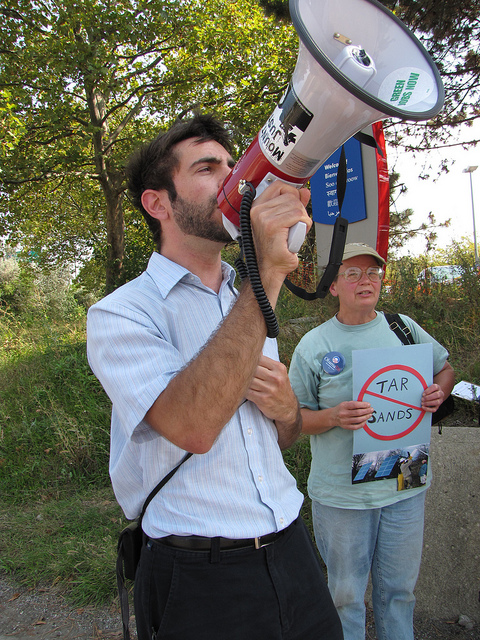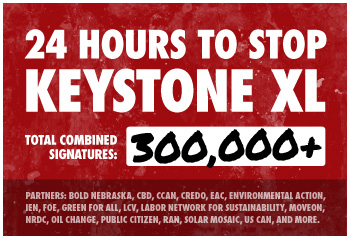1. When they say: “The Keystone XL pipeline will bring down gas prices!”
You can say: In your dreams.
Gas is a global commodity and its price is set by global markets. It rises and falls based on all sorts of factors, including current demand, demand forecasts, global economic conditions, and international events that affect distribution channels. Local supply fluctuations rarely have any but the tiniest impact on gas prices. New pipelines carrying costly-to-extract tar-sands oil might extend the lifespan of climate-wrecking fossil fuels by a few years, but they won’t bring down the price at the pump. (In fact, in the Midwest, Keystone XL might actually increase the price per gallon — this report explains why.)
2. When they say: “The Keystone XL pipeline will create jobs!”
You can say: If only.
The U.S. Chamber of Commerce claims, ludicrously, that the pipeline will create 250,000 new jobs. Speaker of the House John Boehner (R-Ohio) says 100,000 new jobs are on tap. The pipeline builders are a little more sober but still like to throw around big new-jobs numbers in the tens of thousands. Look closely at them and you realize that their figures are totally fudged: They’re talking about “job years,” not jobs (so it tallied one worker laboring for two years as “two new jobs”).
The only independent report on pipeline jobs, from Cornell [PDF], concludes the project will generate 2,500-4,650 temporary construction jobs. That’s not nothing — but it’s nothing like the astronomical numbers pipeline supporters pull out of their hats. In fact, after a brief initial spasm of construction, the number of permanent jobs created by the pipeline is comically small — as low as 50, according to the Cornell report.
3. When they say: “The Keystone XL pipeline is safe and won’t hurt the environment!”
You can say: That’s always the line, isn’t it?
Unfortunately, in this case we have extensive and recent evidence to the contrary. (The similar Keystone I pipeline has leaked at least 14 times in roughly a year.) The pipeline’s original route was smack over the ecologically sensitive Ogallala Aquifer, which supplies much of the Plains with its fresh water; but even if it gets routed differently, Keystone XL will carry corrosive, unstable, hard-to-clean-up tar-sands sludge across an entire continent using failure-prone systems in hard-to-reach locations. It will be a disaster waiting to happen.
4. When they say: “The Keystone XL pipeline will bolster our national security!”
You can say: Stop living in the 1970s!
We’re supposed to be happy about tapping new tar-sands oil reserves from our friends in Canada because that means we’re buying less oil from other, less-friendly nations in the Middle East, Latin America, or elsewhere. But even pipeline proponents admit that most of the tar-sands oil will be headed overseas to customers in Asia, no matter where it’s refined. Anyway, our national security today is far less dependent on overseas oil than it was 30, 20, even 10 years ago. But rising global temperatures threaten to destabilize our food and water supplies, drown our coasts, and assault us with extreme weather. If we don’t get started on changing our carbon-emissions habits soon, the national-security problems caused by a climate-change feedback loop will make us nostalgic for the days when all we had to worry about was OPEC.
5. When they say: “If we don’t use the tar-sands oil, someone else will!”
You can say: Buck up, mate!
According to this fatalistic, all-or-nothing logic, any and all action we can imagine taking to mitigate climate change is hopeless unless we can get every nation on earth to agree to take the same steps at the same time. But that’s never the way real political change unfolds: Someone always has to take the first step, raise awareness, trigger new ways of looking at a problem, and start a chain reaction.
Bonus Lunatic Congressperson Argument:
When they say: “The Keystone XL pipeline will help caribou mate!”
You can say: Well, what can you say? Do you need to say anything at all?
Read more:
- Tell your senator: Hold the line in the tar sands
- Keystone XL: The story of a big-ass pipeline proposal, so far




